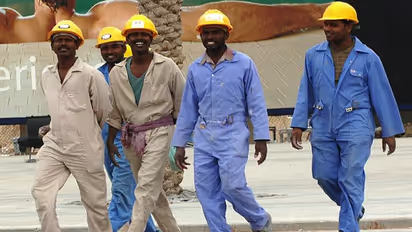'Pakistanis work less, fight more in Dubai...' Pak journalist reveals why Arabs prefer Indian workers (WATCH)

Synopsis
Senior Pakistani journalist Najam Sethi recently revealed the challenges faced by Pakistanis in the UAE job market and the preference for Indian workers by Emirati employers.
In a recent discussion on Samaa TV, senior Pakistani journalist Najam Sethi shed light on the complex dynamics surrounding Pakistanis working in the United Arab Emirates (UAE). His insightful commentary highlighted the challenges faced by Pakistanis in the UAE job market and the preference for Indian workers by Emirati employers. Sethi's remarks unravel a multifaceted issue, bringing attention to the work ethic, religious practices, and overall conduct of Pakistani labourers in Dubai.
During the "Sethi Say Sawal" show, a senior Pakistani journalist was questioned about the UAE's decision to suspend issuing visit and employment visas for Pakistanis, particularly in comparison to Indians. The inquiry sought to understand the reasons behind this disparity.
In response, Najam Sethi highlighted that the UAE's strict stance against political involvement clashes with the tendencies of some Pakistanis to engage in street protests, particularly in support of figures like former Pakistan PM Imran Khan.
"I was seeing on Facebook, a UAE official had a small guidance for Pakistanis working in Dubai. The official asked what is the problem of Pakistanis in Dubai? He said the country doesn't allow political activities and don't want any disruption. The UAE official said that Pakistanis have taken to the streets to protest in support of Imran Khan and causing disruption. He stated this politics is not allowed in UAE. He asked Pakistanis what are they doing and urged them to stop playing politics on their soil. He added that if this continues then they will tighten rules of issuing visas for Pakistanis. He further stated that the Pakistani community assumed Dubai is London where they can protest on the streets. He reiterated that Dubai won't tolerate this kind of behaviour. There is no democracy or freedom of speech in Dubai and they run their country on this basis with tight control. Dubai won't want fight within Pakistanis and their fight with Indians to come to their soil," Sethi remarked.
Moreover, Sethi highlighted the contrasting work ethics between Pakistani and Indian labourers, as perceived by Emirati employers. According to his account, Pakistani workers are often viewed as less industrious and more prone to engaging in religious activities during work hours. This perception has contributed to a preference for Indian and Sri Lankan laborers who are perceived to be more dedicated and efficient.
"I'll give you an example of what's the difference between Indians and Pakistanis. This is not what I am saying, but rulers of Dubai have told this. Pakistanis don't work as hard as Indians. Pakistanis are religious and always bring religion to the forefront at workplaces. For Indians, work comes first then religion. Indians and Sri Lankan labourers' training is better than Pakistanis and they don't fight as well. They also do better work. Pakistanis fall short in these places. This has become an issue for Pakistan. We want to support Pakistanis and invite labourers from the country to Dubai, but Pakistanis there always fight and don't complete their work as well," the senior Pakistani journalist said.
The anecdote shared by Sethi about a Pakistani security guard prioritizing his religious obligations over his job duties underscored a broader issue of professionalism and commitment among Pakistani workers in Dubai.
"An MD of a company told me that his security guard was a Pakistani. He said that even I am a Muslim and whenever I would arrive the gate used to always be closed and I would have to horn at the gate. Then he got to know that the security guard used to carry out his namaz 5 times and used to be unavailable at times in the night as well. So he thought that when the Pakistani security guard is not doing his job then might as well replace him with an Indian or Sri Lankan," Sethi concluded.
Check the Breaking News Today and Latest News from across India and around the world. Stay updated with the latest World News and global developments from politics to economy and current affairs. Get in-depth coverage of China News, Europe News, Pakistan News, and South Asia News, along with top headlines from the UK and US. Follow expert analysis, international trends, and breaking updates from around the globe. Download the Asianet News Official App from the Android Play Store and iPhone App Store for accurate and timely news updates anytime, anywhere.